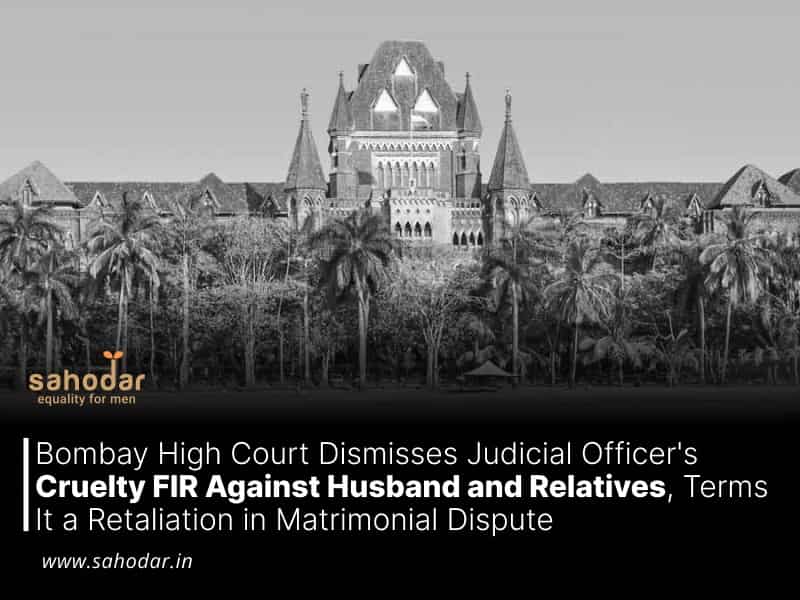The Bombay High Court on Friday dismissed judicial officer’s cruelty FIR against husband and in-laws, alleging cruelty and other offences, stating it was a retaliatory move in a matrimonial dispute.
A division bench comprising Justice A.S. Chandurkar and Justice Jitendra Jain noted that the delay in filing the FIR, coupled with the lack of incidents substantiating the alleged offences, indicated it was a counterblast.
“The FIR was lodged on 9th July 2023 which is almost after a month. It is stated that due to seriousness of the matter and as the incident had occurred at the workplace, the Respondent No.2 avoided to give the report. This aspect when considered cumulatively with all other aspects goes to show that the FIR is lodged only as a counter blast to the matrimonial dispute between the Petitioner and the Respondent No.2.”
The court granted two writ petitions filed by the complainant’s husband and his relatives, seeking to quash an FIR dated July 9, 2023.
The couple, who met through a matrimonial site, married in February 2018. The husband works as a Provident Fund Commissioner in Pune, while the wife serves as a judicial officer at the Tasgaon Court.
The FIR alleged that after their marriage, various matrimonial disputes arose, prompting the husband to file for divorce in 2023. The complainant claimed that on June 7, 2023, her husband and his brother entered her judicial chambers in the morning, pressuring her to sign mutual consent divorce papers. When she refused, other family members repeated the act in the afternoon, allegedly hindering her from performing her official duties.
The FIR was filed under Sections 186 (obstructing a public servant in the discharge of duties), 342 (wrongful confinement), 353 (assault or criminal force to deter a public servant from duty), 498A (cruelty by husband or relatives), and 506 (criminal intimidation) of the IPC. Consequently, the husband and his relatives approached the High Court for relief.
The court observed that the incidents described in the FIR did not satisfy the requirements to constitute the alleged offences. It stated that the morning incident did not amount to obstructing the wife, a judicial officer, in performing her public duties.
The court further noted that in the afternoon session, the complainant voluntarily left the dais upon being informed by her peon about her relatives’ presence in her chambers. Since the relatives stayed in the chambers while the complainant was in the court hall, no obstruction occurred. Moreover, she continued to perform her official duties that day, reinforcing the absence of any hindrance, the court concluded.
The court stated that the FIR did not indicate any physical confinement of the wife. Although the husband and his relatives verbally pressured her to sign divorce papers, she continued attending court sessions as usual. There was no evidence of force intended to prevent her from performing her duties, the court noted.
The court held that the actions described, including verbal disputes and attempts to coerce the signing of divorce papers, did not constitute obstruction of public duties, wrongful confinement, assault, cruelty, or criminal intimidation. It also emphasized the absence of any demand for property or valuable security, a necessary element under Section 498A.
The court noted that the FIR was filed nearly a month after the incident. While the wife, a judicial officer, attributed the delay to the seriousness of the matter and the incident occurring at her workplace, the court opined that the delay, coupled with other circumstances, suggested the FIR was a retaliatory measure in the ongoing matrimonial dispute.
Despite the gravity of the allegations, the evidence presented in the FIR was deemed insufficient to substantiate the charges. Exercising its inherent powers under Section 482 of the CrPC, the court quashed the FIR.

